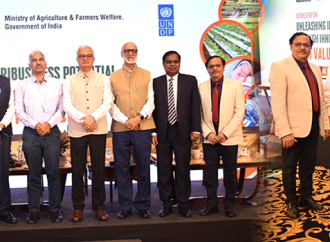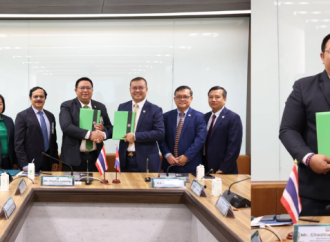Conduct of Regional Symposium on Marketing and Finance of the Organic Supply Chain APRACA conducted Regional Symposium on Marketing and Supply of Organic Supply Chain in collaboration with FAO Regional Office for Asia and the Pacific (FAO RAP), Agricultural and Food Marketing Association for Asia and the Pacific (AFMA), International Federation of Organic Agriculture Movements
Conduct of Regional Symposium on Marketing and Finance of the Organic Supply Chain
APRACA conducted Regional Symposium on Marketing and Supply of Organic Supply Chain in collaboration with FAO Regional Office for Asia and the Pacific (FAO RAP), Agricultural and Food Marketing Association for Asia and the Pacific (AFMA), International Federation of Organic Agriculture Movements (IFOAM), and the local host organization, National Agricultural Cooperative Federation (NACF) at NACF Head Office in Seoul, Korea on September 23 – 26, 2012. A total of 57 participants attended the Symposium from 16 countries and 4 international organizations.
At the Opening Ceremony, Mr. Jong-Il Yoon, Vice- Chairman and President of NACF delivered an Opening Address followed by the Welcoming Addresses by Mr. Ralph Houtman, Regional Marketing and Agricultural Finance Officer of FAO RAP, H.E. Mr. Pal Buy Bonnang, Chairman of APRACA, Ms. Juejan Tangtermthong, Executive Director of AFMA, and Mr. Andre Leu, President of IFOAM.
Dr. Sung-Hoon Kim, Professor Emeritus, Chung-Ang University of Korea, Former Minister of Agriculture and Forestry of Korea delivered a keynote speech, where the introduction and current situation of organic farming in Korea were presented.
The Symposium accommodated a total of eight sessions, four sessions in marketing sector and another four sessions in finance sector, on three days of September 24 – 26. In the finance Sector, a total of 11 speakers presented papers, one speaker from each of Pakistan, Bangladesh, Japan, Korea, and Malaysia, and two speakers from each of the Philippines, Thailand, and India. The executive summary of the sessions of finance sector is attached at the bottom of this article. All the presentations of the Symposium are available to be downloaded at http://www.organicseoul1202.org/download.html .
A field trip was organized on September 23 before the sessions started. Participants of the Symposium visited Hanaro Market in Seoul, a retail and wholesale market operated by NACF where they observed the marketing of farm products of Korea through agricultural cooperative channel. Participants also visited an organic product processing and packing plant in Asan City, some 100 kilometers from Seoul, operated by Hansalim Cooperative, a cooperative affiliated with farmers in the region exclusively handling organic farm products.
[Executive Summary of the Finance Sessions]
On the financing aspects of organic farming, eleven papers on eight countries were presented in four sessions. On three countries – the Philippines, Thailand, India – a paper with case study has been presented for each country. Most authors are either rural financing practitioners or researchers with academic institutions.
In the eight countries represented by the papers, the share of organic farm products is less than one percent, except for the case of Pakistan, where thirty-three percent of farmers are estimated to be engaged in organic farming. The reality in the Region is that the organic farming is at the emerging stage. The reasons of the low level of organic farming identified by the papers and discussions are:
1) Weak consumer recognition – consumers consider organic produce is only in niche market;
2) Less enthusiastic Government policy;
3) Low commercial incentives; and
4) Possible conflict with national food security.
Many countries in the Region operate certification scheme for organic products. The certification system is controlled either by the Government or private organization. Some countries classify organic farming in a tiered scheme: organic, no pesticide, and low pesticide produce. No and low pesticide products are considered as interim stages toward organic farming. In some countries, relevant institutions or legal framework for the promotion and regulation of organic farming is under operation. The National Organic Agricultural Board of the Philippines and the Center for Environment, Technology and Development of Malaysia are good examples.
In most countries in the Region, there is no separated financial service dedicated to the organic farming. In many instances, converting into organic farming from traditional chemical farming is difficult since loan opportunities are hardly available. Successful pilot cases, however, such as Hom Mali rice in Thailand and Tamil Nadu rice in India are presented in a session.
For the proliferation of sustainable organic farming, increased consumer recognition and organic premium, Government initiative for Green Growth, financial institutions’ willingness to expand green financing have to go hand in hand. The consciousness of organic farming as good practices for human health and the environment is indispensible for a successful promotion of organic farming.
The authors of papers have a clear message to the APRACA member institutions: The APRACA member institutions have to work together and form a network to lead the Region’s concerted efforts toward an organic and environmentally-friendly farming with close cooperation with Governments and the Non-Government Organizations. Organic farming is a right direction but it has a long way to reach. We need a genuine “Green” Revolution.















